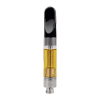| Key Takeaways |
|---|
| HHC is a unique cannabinoid derived from hemp through the hydrogenation of CBD. |
| HHC interacts with the body’s endocannabinoid system, particularly with CB1 receptors, but in a more moderate way than THC. |
| Preliminary research suggests potential therapeutic benefits of HHC in pain management, sleep regulation, and anxiety relief. |
| More research is needed to fully understand the extent and mechanisms of HHC’s therapeutic effects. |
Understanding HHC: An Introduction
Hexahydrocannabinols, or HHCs for short, are a fascinating group of compounds that have been making waves in the world of pharmacology. But what exactly is HHC? Well, let's dive right in!
HHC is a type of cannabinoid, similar to the more well-known CBD and THC. However, unlike its famous cousins, HHC is derived from hemp through a unique process that involves the hydrogenation of CBD. This results in a compound that shares similarities with other cannabinoids but also boasts its own unique properties.
> "HHC is a testament to the incredible diversity and potential of cannabinoids. Its unique derivation process and properties set it apart in an exciting way." - Anonymous Scientist
Now, you might be wondering, what makes HHC so special? Here's a quick list to give you an idea:
- It's derived from hemp, making it legal in many places where THC is not. - It interacts with the body's endocannabinoid system in unique ways (more on this later). - Early research suggests it may have potential therapeutic benefits.
For a more detailed dive into HHC and how it compares to other cannabinoids, check out this [informative article](https://hhcherb.com/article/understanding-cbd-hhc-cannabinoids).

In the next section, we'll delve deeper into the pharmacodynamics of HHC - how it interacts with our bodies and what effects it can have. Stay tuned!
Pharmacodynamics of HHC
When it comes to understanding how HHC interacts with the human body, things get a bit complex. But don't worry, we're here to break it down for you!
HHC, like other cannabinoids, interacts with the body's endocannabinoid system. This system is made up of receptors that are spread throughout the body and are involved in regulating a variety of physiological processes.
Here's a simple table to help you understand how HHC interacts with these receptors:
| Receptor | Interaction | | -------- | ----------- | | CB1 | Moderate | | CB2 | Low |
The interaction with CB1 receptors is particularly interesting. These receptors are primarily found in the brain and are responsible for the psychoactive effects associated with THC. However, HHC's interaction with these receptors is more moderate, suggesting it may have less potent psychoactive effects.
For a more detailed comparison of HHC and THC, including their interactions with the endocannabinoid system, check out this [comprehensive article](https://hhcherb.com/article/hhc-vs-thc-benefits-differences-downsides).

In our next section, we'll explore the potential medical applications and benefits of HHC. Stay tuned!
Medical Applications and Potential Benefits of HHC
HHC is not just another cannabinoid. It's a potential game-changer in the world of medicine. The unique properties of HHC have opened up a world of possibilities for its use in treating various conditions.
> "The potential therapeutic benefits of HHC are vast and exciting. From pain management to sleep regulation, this cannabinoid is showing promise in a range of applications." - Anonymous Medical Professional
Here are some potential medical applications of HHC:
- **Pain Management**: Preliminary research suggests that HHC could be effective in managing chronic pain, thanks to its interaction with the body's endocannabinoid system. - **Sleep Regulation**: Some studies indicate that HHC may help regulate sleep patterns, potentially benefiting those with insomnia or other sleep disorders. - **Anxiety and Stress Relief**: Like many cannabinoids, HHC may have calming effects that could help manage anxiety and stress.
It's important to note that while these potential benefits are promising, more research is needed to fully understand the extent and mechanisms of HHC's therapeutic effects. For a deeper dive into the potential benefits of HHC for sleep regulation, check out this [informative article](https://hhcherb.com/article/hexahydrocannabinol-hhc-sleep-benefits).

As we continue to explore the pharmacology of HHC, it's clear that this unique cannabinoid holds great promise. From its intriguing interactions with the human body to its potential therapeutic applications, HHC is undoubtedly a compound worth watching in the world of pharmacology.
What is HHC?
HHC, or Hexahydrocannabinols, is a type of cannabinoid derived from hemp through the hydrogenation of CBD.
How does HHC interact with the human body?
HHC interacts with the body’s endocannabinoid system, particularly with CB1 receptors, in a moderate way.
What are the potential medical benefits of HHC?
Early research suggests HHC could be beneficial for pain management, sleep regulation, and anxiety relief.
Is HHC legal?
As HHC is derived from hemp, it is legal in many places where THC is not. However, laws can vary by location.
Does HHC have psychoactive effects?
While HHC does interact with CB1 receptors in the brain, its effects are believed to be more moderate than THC.
Is more research needed on HHC?
Yes, while early findings are promising, more research is needed to fully understand HHC’s therapeutic effects and mechanisms.







